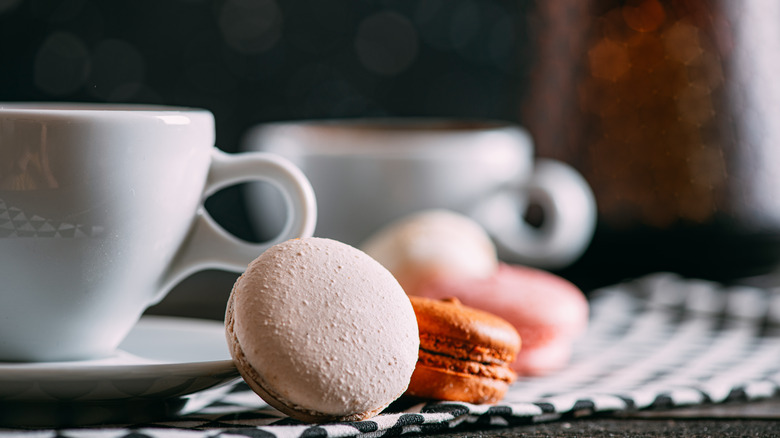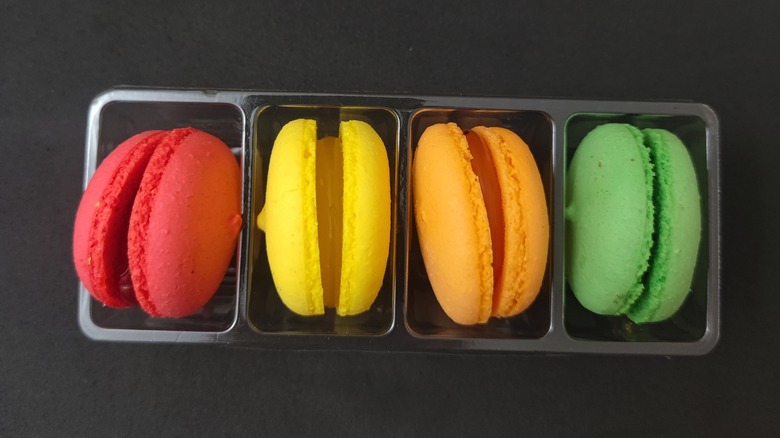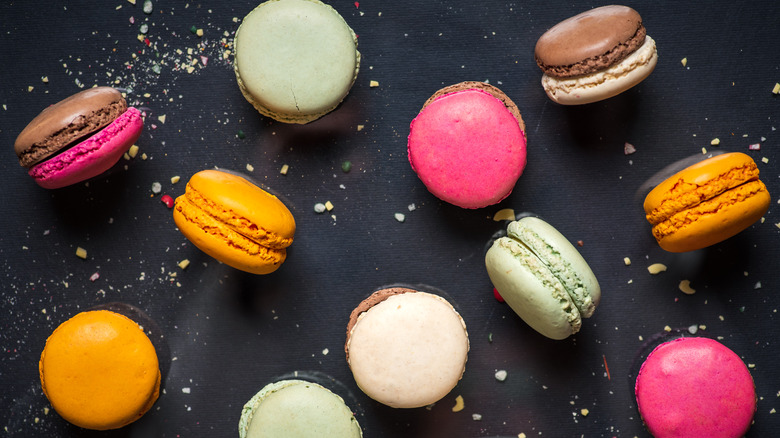The Worst Weather For Making Macarons
There is something magical about a perfect macaron. The French patisserie classic is an icon of the pastry world and a benchmark project for many home bakers hoping to test their skills. The cookies are a test of both technical ability and patience — requiring weight-specific portions of each ingredient, careful folding of the individual ingredients, and whipping up a truly perfect stiff peak meringue. The macarons are made with almond flour and a meringue base that makes them almost impossibly light, crisp, and irresistibly sweet. And, if made correctly, they're a heavenly treat. However, macarons are often plagued with issues, from shells that refuse to form to hollow-centered cookies, and unfortunate splits on the top that mar any planned displays or photo sessions.
But the success of your batch of macarons is not just a matter of skill. The weather might also be working against you. Like other confections, such as homemade divinity candies, macarons turn out best in dry weather. So, what's the worst weather for making macarons? Since the dessert fares best in dry weather, high humidity will work against your macaron-making endeavors. The reason for this is two-fold. For one, humidity makes it more difficult for a shell to form on the outer layer of your macarons during the drying stage. It can also make your French meringue less likely to form its necessary structure. With this in mind, you might want to check the weather forecast if you're making macarons.
How humidity impacts macarons
Beyond humidity, a high dew point can also negatively impact your macarons. But what's the difference between the two? Well, humidity is the amount of water vapor present in the air; which means that the more water vapor present, the more humid it is. The dew point, on the other hand, is the temperature at which humidity can hit 100%. A higher dew point means the air can hold on to more moisture than lower dew point conditions. So, you'll want to pay attention to both when whipping up your egg whites and sifting your almond flour.
The technical reason behind humidity's tendency to ruin a perfectly good batch of macarons starts with sugar and egg whites. For one, sugar attracts moisture. Therefore, any excess moisture in the air is likely to absorb into your sugar, causing your meringue to turn clumpy and gummy. And that is not what you want in a macaron.
But beyond wrecking your meringue, humidity and a high dew point can make drying your macarons much more difficult. Drying your cookies before baking is an essential part of macaron-making. During the drying process, the cookies form a shell that, once baked, takes on a shiny exterior. If the humidity is too high, it will be harder to form the shell necessary for a perfect macaron. However, you don't have to let these less-than-ideal weather conditions ruin your shells. There are several ways to cope with high humidity when making macarons.
How to make it work
High humidity can indeed make it incredibly difficult to make a decent macaron. But if you're string-willed enough, stubborn weather alone shouldn't stop you from going ahead and making that batch. After all, there are a few ways to adjust your macaron recipe to cope with sticky weather. To start, you can try pumping up that air conditioning and closing any exterior windows. Closed windows will prevent humid air from entering your house, and your air conditioning will increase airflow, helping your macarons form their shells.
You might also want to bring some fans into your kitchen. This can help to increase airflow more locally. A dehumidifier can also be helpful while making macarons, as it can remove excess moisture from humid pockets of air. Of course, you will also want to let your macarons sit for extra time in more humid conditions. Generally, you should let your macarons sit for 30 minutes before baking. However, in more humid weather, you will want to let your cookies sit for almost 45 minutes, so a shell properly forms. These tips can help you to achieve beautiful macarons in even the worst weather. However, making macarons in muggy weather ultimately means going through some trial and error.


